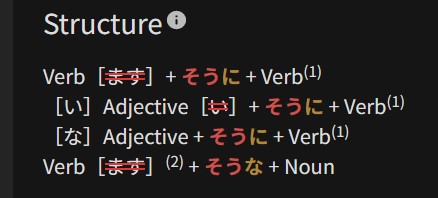優しそうに犬を撫でた。
Shouldn’t the particle be な instead of に because it comes before a noun?
優しそうな犬を撫でた。

優しそうに犬を撫でた。
Shouldn’t the particle be な instead of に because it comes before a noun?
優しそうな犬を撫でた。
It’ll change the meaning because of the particle. The first sentence means “I gently pet the dog” whereas the next sentence means “I pet the nice-looking dog.” Both are grammatically correct, but the meanings are different. Hope that helps!
Just to add onto what the other person said, な usually describes nouns 優しそうな犬 and に describes actions 優しそうに撫でた
The easiest way to put it,
this is not how Japanese works in terms of particles. The word after the particle never matters at all. Never, no exceptions. Only the word before the particle matters. The particle tells you what kind of word it is connected to, but that word’s position in the sentence is irrelevant to the particle itself.
そうに
Verb[ます] + そうな + Noun
I am asking because of this explanation of usage for そうに
As you can see, な is used before the noun.

But 優しい is not a verb 
What you really have here is this combination:
[い」Adjective + そうに + Verb
because you’re “gently petting”, the dog is secondary in this case. So it’s really
優しそうに撫でた
with the dog added in as the object of the action.
When you brought that up I was also a bit confused, but I think I understand it now. The important part is in the grammar explanation: “may be followed by な when acting as an adjective, or に when acting as an adverb”
In this kind of “structure formula”, A+B is sometimes applied to patterns where A must be immediately followed by B (like “Verb stem + そう”) and sometimes it’s applied to patterns where A and B just have some kind of connection (like “そうに + verb”) but the position in the sentence is not fixed.
I think it can be a bit confusing that + is used for both types of relationship, maybe there is some way to make it more clear? OTOH you will get used to this anyway as it’s pretty common when the part before the + ends in a particle.
thank you all for the prompt replies
Japanese grammar is admittedly harder for me to grasp and understand than English does
I am not sure what is the best way to approach it